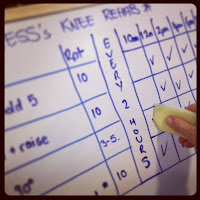[View the republished version on my new blog]
If you've read my other posts this year, you've probably picked up that life wasn't that easy last year. I'm ok to admit that, in fact, I think we should all talk about our struggles more often. As such, I've been reflecting on the recent months and I felt it might be good to share some of my burnout recovery experience with y'all.
If you've read my other posts this year, you've probably picked up that life wasn't that easy last year. I'm ok to admit that, in fact, I think we should all talk about our struggles more often. As such, I've been reflecting on the recent months and I felt it might be good to share some of my burnout recovery experience with y'all.
[Disclaimer:
I'm not a professional in this matter so please read this
knowing that I am speaking only from my own personal research and experience.
I'm also only about 6 months into my own recovery and therefore fully expect
that my thoughts and advice will evolve.]
Stage
1: Know what burnout is.
I
have found this handbook very easy to read, informative
and therefore incredibly helpful. It describes burnout as:
"a form of chronic strain that develops over time in response to prolonged periods of high stress."It also describes three core dimensions of burnout being:
"emotional exhaustion, depersonalisation, and reduced personal accomplishment."
Sounds scary,
huh? Yeah. It kinda is. Burnout is basically like stress on steroids.
It's easy to ignore the signs and it can even happen when you love what you do. In fact, it's more likely to happen in this case cos you are prepared to go the extra mile (the one that kills you) when you are more passionate.
I discovered I
was burnt out in about October 2012, which meant I probably had it for at least
a few months prior. Unfortunately it wasn't until October 2013 (a year later) that I was able to
step into a space of recovery. I've heard different opinions regarding how long burnout recovery can take but it seems the average is up to 2 years. #yikes
Stage 2: Prepare
yourself for recovery.
- Relationships
will change. The difficult
times in life are great for revealing the true status of your relationships.
Burnout is no different. It's tough. People are in your life for a reason but in reality, very few will contribute to your support and healing. Their silence will hurt. But that's ok. It will feel like they're choosing your 'ex' over you (if burnout was like a bad relationship break up). You just gotta move on because during this early stage, you have to think about your own well-being and not the state of every single friendship in your world.
-
Your capacity will disappear. I used to get my kicks out of having multiple priorities and responsibilities, juggling crazy hours, long days, volunteering, public speaking, the works! There came a point where I just couldn't do all of that - I would get really sick, lose focus, feel anxious... I just didn't feel like me anymore. It makes you feel pretty lost and I found it challenged my sense of identity.
- Cut out major responsibilities for the short term, and slowly re-introduce them as you begin to feel better. For me I had to stop working full time, and thanks to the support from my husband, was able to be at home more and take care of life's simple responsibilities.
Stage
3. Walk the recovery journey. Some
tips:
- You have your good days and your bad days. Good days might mean you have the energy for a walk or run, a feeling of general happiness and a desire to be around people you would normally place in the "too draining" category. Bad days might look like staying in bed, unable to leave the house, re-watching a season (or two) of your favourite tv show. FYI - both good and bad days are not just allowed but are to be expected.
-
Celebrate the small wins. As you rediscover your confidence, slowly, as new
adventures entice you out of your cave and back into the land of the
living, there will be moments when you achieve something. Even if it's just
getting through your emails, or nailing that work presentation, realise that
you DO still have something to offer and you ARE a highly skilled
individual.
-
Acknowledge how bad it got, and that you have responsibility here, too.
Brace yourself though, its hard to look back and you might discover it was
a lot worse than you thought and you have more work to do to get better. (As
was the case for me...)
-
Evaluate your social media presence. I've found socmed to be pretty
unhelpful with my recovery. Unfriend or at least unfollow people that bring up
familiar and unwelcome feelings of anxiety. It only drags you back into the
place where your head is filled with crap you don't need.
- Learn from the past. Don't
make the same mistakes again. For me, I learned that doing too much, for
too long, in an environment that wasn’t healthy for me was the killer combo. From
now on I will be more discerning with people and projects I attach myself
to, especially knowing now how much I pour myself into the work I
do.
It's not easy but I can honestly say that 6 months on, I am a million times better already. There is still a ways to go but I feel like I'm over the worst of it and I'm just about ready to take on a new adventure.
Thanks for listening. Hope this has helped someone.
JB xo

.png)

















